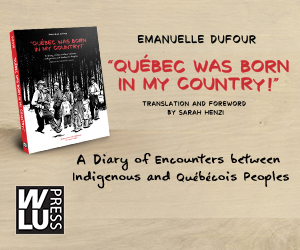Aparna Kaji Shah on Writing Strong Women, the Importance of Writer Friends, & the Timeless Value of Middlemarch
The title of Aparna Kaji Shah's The Scent of Mogra (Inanna Publications) refers to species of flowering jasmine, a beautiful and fragrant plant cultivated in South and Southeast Asia. It gives a nod to the collection's subject: women who thrive and grow in tough circumstances. In the characters' cases, the challenges they face are social and cultural, as they strive to find themselves in a world that devalues them for their gender. Set in different times and places ranging over 100 years, these stories are powerful reminders of women's resilience and strength.
We're pleased to welcome Aparna to Open Book today to discuss The Scent of Mogra and her writing process. She tells us about the questions she was exploring in this book; her focus on portraying women as much more than victims, even in the most difficult of situations; and the timeless classic novel that has shaped her writing.
Open Book:
Tell us about your new book and how it came to be
Aparna Kaji Shah:
My book, The Scent of Mogra and Other Stories, is a collection of six short stories with strong female protagonists. Five of the six stories are set in India and range in time from the eighteenth century to the present day. The stories deal with women’s lives and their relationships in a male-dominated culture. When I had written four stories, I realized that I could put them together in a collection since they all had women as central characters; it was later that I added two more stories.
OB:
Is there a question that is central to your book, thematically? And if so, did you know the question when you started writing or did it emerge from the writing process?
AKS:
The questions that are central to the book are: how do women cope with challenges and tragedies in their lives? How do they take control of their lives as difficult situations unfold around them? And finally, how do they move forward? I did not start out with these questions in mind; they emerged as I wrote the first few stories and I saw that I had a theme linking the stories.
OB:
Did this project change significantly from when you first started working on it to the final version? How long did the project take from start to finish?
AKS:
My perspective had changed from when I first started working on it. I realized that I did not want to portray women as victims, but rather as people with their spirits intact despite tragedies; people who can make something meaningful of their broken lives. This project lasted many years, from 2004 to 2018. I was also working on other writing during that time.
OB:
What do you need in order to write – in terms of space, food, rituals, writing instruments?
AKS:
I need to be alone in a quiet place, preferably in my bedroom where I like to sit on an armchair with my laptop. I like to get up occasionally and look out of the window at my yard or go and get a mug of herbal tea from the kitchen.
Your CanLit News
Subscribe to Open Book’s newsletter to get local book events, literary content, writing tips, and more in your inbox
OB:
What do you do if you're feeling discouraged during the writing process? Do you have a method of coping with the difficult points in your projects?
AKS:
I first try to think the problem through by putting away my laptop. I might pick up a pen and paper and jot down ideas. If this does not lead anywhere, I walk away from the work for a while; I go for a walk, read a book, or even cook something to clear my mind. And if I meet my writer friends, I discuss the issue with them... that is always helpful.
OB:
What defines a great book, in your opinion? Tell us about one or two books you consider to be truly great books.
AKS:
One of the greatest books I’ve ever read is Middlemarch by George Eliot. For me, a great work of fiction must have characters who change and develop, like Dorothea does in Middlemarch, as does Lydgate. Not only is the psychology of these characters fascinating, but the narrative and plot hook you from the beginning and keep you engaged till the very end. There is a vibrancy and concreteness in Eliot’s use of language which is a pleasure to read and tells the reader so much about the character and the situation at hand. Though it was written in the nineteenth century, the work feels modern because it deals with issues we are still concerned with... the status of women, the nature of marriage, life in a provincial town, attitude towards change and so on. Great books like Middlemarch will continue to be relevant as long as there is a community of human beings who have relationships with other human beings.
OB:
What are you working on now?
AKS:
I am working on a novel called The Root of the Matter. It is about the impact that displacement has on people’s lives. Some people adjust better than others when they move from one place to another, while many find that their feelings of alienation lead to a paralysis of sorts and they cannot function as they used to. I have written a first draft of the novel and need to revise and edit... several times!
____________________________
Aparna Kaji Shah was born in Mombasa, and grew up in Mumbai. She has a Master’s degree in English and Aesthetics from the University of Bombay, and an M. Phil. in English from SNDT University, Mumbai. After she moved to Canada in 1985, she obtained a B.Ed. from the University of Toronto. She and her husband, and their family, have lived for various periods in the UK, India, and Singapore. She and her husband returned permanently to Canada in 2013 and continue to live in Toronto. Her fiction has been included in several anthologies. The Scent of Mogra and Other Stories is her debut collection of short fiction.




